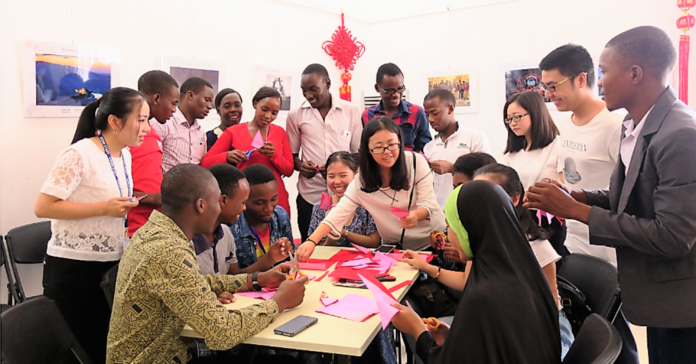Dar es Salaam — On a humid Monday afternoon, students are huddled in a classroom at the Confucius Institute at the University of Dar es Salaam, learning Mandarin.
They all repeat after their teacher in mandarin: “Where is the market?”
The ensuing echo pervades acoustics of the state-of-the-art classroom, decorated with posters scribbled in distinctive Chinese characters.
Their teacher, Xian Li, a 28–year-old expert from Dongbei University in China says today’s lesson is about visiting the market.
“I want them to read this sentence in Mandarin,” she says.
The US$ 2.4 million Institute equipped with lecture halls, multimedia facilities, and an Amphitheatre, built with the grant from the Chinese government has attracted many students.
China, Africa’s most important economic partner is already leaving a large cultural footprint across the continent with dozens of Confucius Institutes, striving to teach Mandarin to help young people eager to explore Chinese culture let alone securing competitive jobs in Chinese companies.
From Cape Town to Accra, to Dodoma, to Kampala, African governments are increasingly adopting Chinese language ostensibly to advance future prospects of the young generation.
At the Confucius Institute, visitors are greeted by a giant statue of the sixth-century Chinese philosopher.
The institute’s director, Prof. Zhang Xiozhen, sits at a desk decorated with the Chinese and Tanzania flags. His office walls are adorned with Chinese cultural drawings.
With more than 50 Confucius Institutes established across Africa, analysts say Mandarin is likely to challenge the ubiquity of European colonial languages in Africa notably English and French.
According to Ziozhen students who successfully complete their Mandarin classes often work in Chinese companies or get scholarships to study in China.
Diana Shayo, 21, a student in Li’s class said she has joined a course in Mandarin because she wants to study engineering in China.
Her friend Zulfa Abdulkadir, 22, says Mandarin will help her break the existing language barrier to explore the Chinese culture.
“I want to experience the Chinese culture and their way of life,” she told Ubuntu Times.
Despite being popular, Confucius institutes in Africa are increasingly criticized, with western governments branding them as tools for spreading Chinese propaganda.
As China’s influence continues to grow, African governments have positively embraced the idea of adding Mandarin in their schools’ curricula.
The Chinese language has been introduced in schools and in higher learning institutions in many African countries including South Africa, Tanzania, and Uganda.
In South Africa, the government’s move to add Mandarin to the national school curriculum in 2015 evoked criticism with the country’s teachers’ union branding it a new form of colonialism.
At Zanaki Girls’ Secondary School in Dar es Salaam, students anxiously scribbling Chinese characters on flip charts, sing and recite poems.
“I love these characters, it’s interesting to write them,” said Sophia Mwenda.
In Dar es Salaam, Mandarin is being taught to people from all walks of life. Business executives, students, and graduates hunting for a job are quite eager to learn the language.
For many in Africa, China has become synonymous with economic success and the ability to speak Mandarin is seen as a stepping stone to other opportunities.
China’s much-noted economic progress has been accompanied by a steady expansion in its cultural and diplomatic influence globally. This growth in the so-called soft power is more apparent in Africa.
One of the toughest challenges the Chinese face as they strive to invest in Africa has been the cultural barrier and language challenges.
As ties between China and Africa grow not only in trade but also in people-to-people exchanges, the interest in Chinese language learning has grown among young people in Africa.
“If you’re committed to learn Chinese, the reward is obvious; this can give you an edge when entering the world of an economic powerhouse and exposing you to a new culture,” says Gao Wei, Cultural Counsellor at the Chinese Embassy in Dar es Salaam.
For Shayo and other students, the future is brighter; Mandarin is most likely to dominate the job market in most countries.
“Learning this language is an added advantage,” she says.

